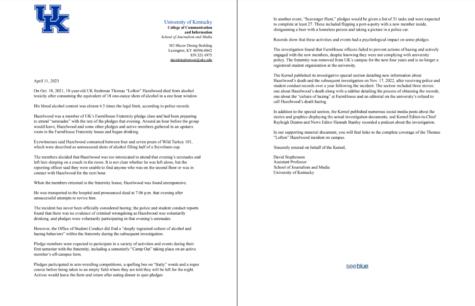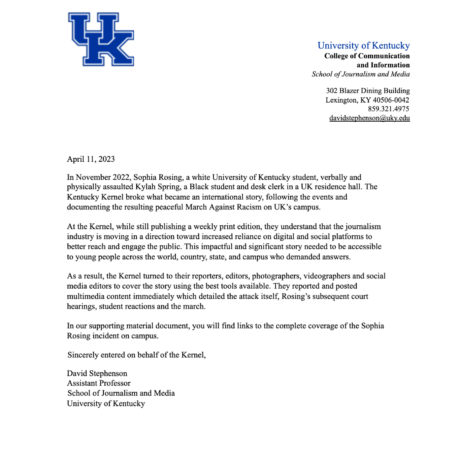Kentucky representative’s endorsement of Clinton was premature
Vermont Sen. and Democratic presidential candidate Bernie Sanders speaks to a crowd at the Village Leadership Academy during a campaign stop in Chicago on Wednesday, Dec. 23, 2015. (Erin Hooley/Chicago Tribune/TNS)
February 16, 2016
Sen. Bernie Sanders is facing a monumental challenge from established Democrats in the primary nomination process, including Kentucky’s own Representative John Yarmuth. His premature endorsement of Hillary Clinton makes Sanders’ path even more difficult.
Currently, Sanders has notched more pledged delegates, but Clinton is prevailing among unpledged delegates, also known as “superdelegates.”
In primaries and caucuses, voters choose who pledged delegates will support in the Democratic nomination process. However, among the 2,382 delegates needed to win the nomination are 712 superdelegates voting for whomever they want, regardless of how the public votes. Yarmuth is one of Kentucky’s superdelegates.
Why do we have superdelegates? Political science professor Stephen Voss said this helps stabilize the nomination process.
“We need more people who, because of their long-term ties to the party, because of their experience, because they represent different electorates … can counterbalance the pure ballot box form of the nomination process,” Voss said.
Yarmuth, the representative for the Jefferson County area, endorsed Clinton in November. In an interview with the Kentucky Kernel, Yarmuth said that he talked with Clinton about their mutual interests in campaign finance reform and gun safety legislation.
Furthermore, Yarmuth said that he does not support Sanders because he is more divisive and would be unable to accomplish anything.
Yarmuth said he will more than likely stand by his decision regardless of voting results.
“I think the only thing that would make me reconsider right now is if something came out of the (email) investigations,” Yarmuth said referencing Clinton’s controversial use of a private email server instead of her government-issued server during her time as U.S. secretary of state.
But why did Yarmuth commit so early to Clinton — after just two debates, before platforms were fleshed out, and before anyone voted?
“Secretary Clinton is a well-known commodity,” Yarmuth said. “Certainly in terms of superdelegates, I think people to one extent or another have been around Bernie so they knew enough about him.”
Yet, Yarmuth’s public commitment to Clinton was hasty and premature for two reasons.
First, Yarmuth’s own political leanings align with Sanders. Yarmuth claims to feel “incredibly passionate” about campaign finance reform, and Sanders is undoubtedly the best candidate for this since he raised the issue and embodies the solution. Sanders also advocates sensible and effective gun control legislation, as opposed to Clinton’s rhetoric on the same subject.
“I agree with Bernie on virtually everything,” Yarmuth said.
Second, Yarmuth’s endorsement will help to sway the election in Clinton’s favor. The Democratic establishment will be able to express their power with their superdelegate votes, but they are stretching it too far by giving a head start to Clinton prior to campaigning and voting.
When they made Clinton into the frontrunner by delegate count, the establishment made “electability” into an issue, and now many people use this as justification for their choice. In reality, Sanders performs better than Clinton in head-to-head matchups with Republicans.
If Clinton wins, Yarmuth should regret playing a role in this biased nomination process. Superdelegates across the nation need to quiet down and listen first to the American people. But, if they won’t listen to our vote, then hopefully they will listen to our voices.
“I haven’t gotten much feedback, either positive or negative,” Yarmuth said.





















































































































































